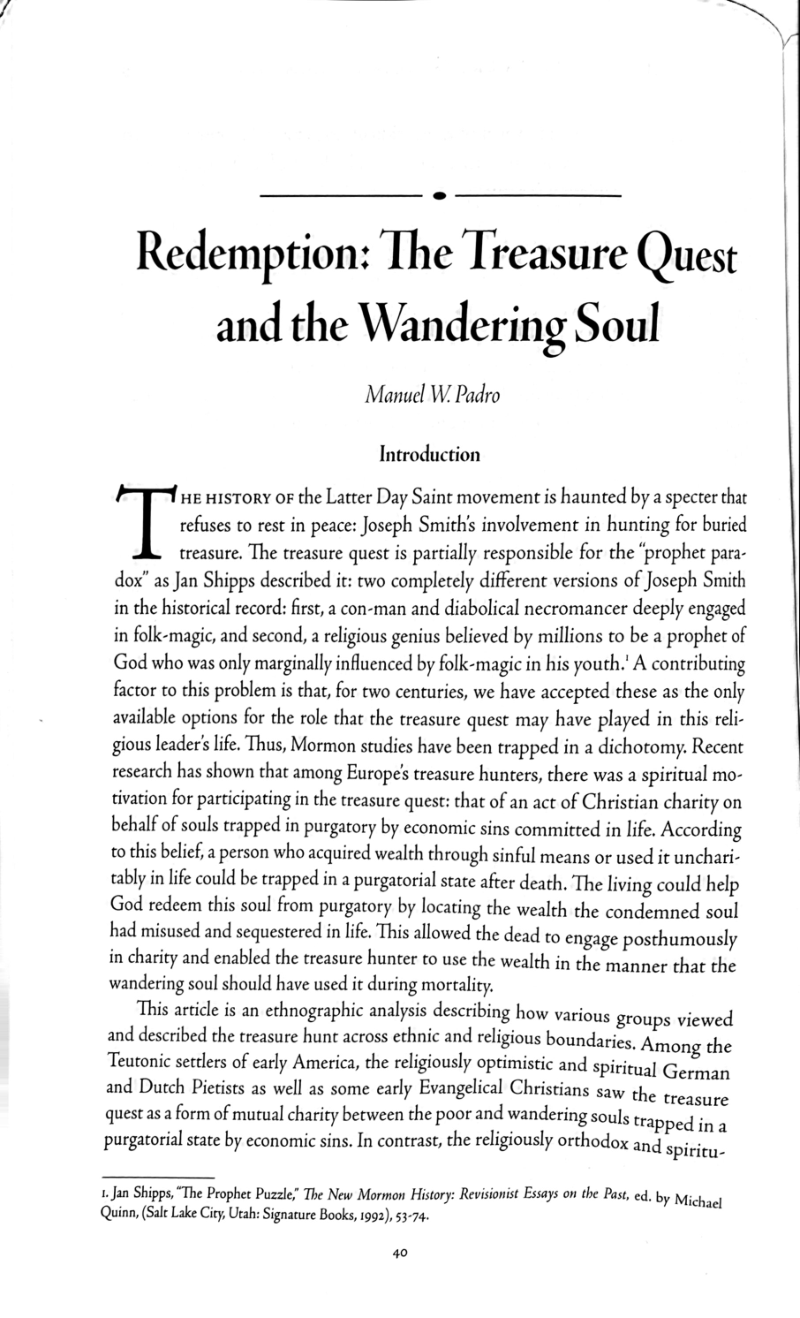Manuel W. Pedro situates the Smith family's interest in treasure digging and other activities in light of 19th-century folk-Christianity and spirituality.
- Type
- Academic / Technical Report
- Source
- Mauel W. Pedro Non-LDS
- Hearsay
- Direct
- Reference
Manuel W. Pedro “Redemption: The Treasure Quest and the Wandering Soul,” The John Whitmer Historical Association Journal 40, no. 2 (Fall/Winter 2020): 40-80
- Scribe/Publisher
- The John Whitmer Historical Association Journal
- People
- Mauel W. Pedro
- Audience
- Reading Public
- Transcription
Introduction
The history of the Latter Day Saint movement is haunted by a specter that refuses to rest in peace: Joseph Smith’s involvement in hunting for buried treasure. The treasure quest is partially responsible for the “prophet paradox” as Jan Shipps described it: two completely different versions of Joseph Smith in the historical record: first, a con-man and diabolical necromancer deeply engaged in folk-magic, and second, a religious genius believed by millions to be a prophet of God who was only marginally influenced by folk-magic in his youth. A contributing factor to this problem is that, for two centuries, we have accepted these are the only available options for the role that the treasure quest may have played in this religious leader’s life. Thus, Mormon studies have been rapped in a dichotomy. Recent research has shown that among Europe’s treasure hunters, there was a spiritual motivation for participating in the treasure quest: that of an act of Christian charity on behalf of souls trapped in purgatory by economic sins committed in life. According to this belief, a person who acquired wealth through sinful means or used it uncharitably in life could be trapped in a purgatorial state after death. The living could help God redeem this soul from purgatory by locating the wealth the condemned soul had misused and sequestered in life. This allowed the dead to engage posthumously in charity and enabled the treasure hunter to use the wealth in the manner that the wandering should have used it during mortality.
This article is an ethnographic analysis describing how various groups viewed and described the treasure hunt across ethnic and religious boundaries. Among the Teutonic settlers of early America, the religiously optimistic and spiritual German and Dutch Pietists as well as some early Evangelical Christians saw the treasure quest as a form of mutual charity between the poor and wandering souls trapped in a purgatorial state by economic sins. In contrast, the religiously orthodox and spiritually pessimistic paradigm descending from Puritanism saw it as witchcraft, while the more skeptically minded saw it as a fraud. By using the New Englander’s representations of the treasure quest, it is possible to demonstrate how they misdescribed that which they did not observe by imagining the activities of treasure hunters through the labels of witchcraft and fraud. The article discusses some obvious parallels between the Smith family’s tradition of treasure hunting and how it was practiced among those who saw it as a form of folk-Christianity. By comparing descriptions of the Smith treasure quest to that of religiously motivated treasure quests, it is possible to demonstrate that this tradition likely impacted the Smith family’s folk-Christianity and spirituality and calls into question the reliability of accounts that include witchcraft allegations.
- Citations in Mormonr Qnas
The B. H. Roberts Foundation is not owned by, operated by, or affiliated with the Church of Jesus Christ of Latter-day Saints.

